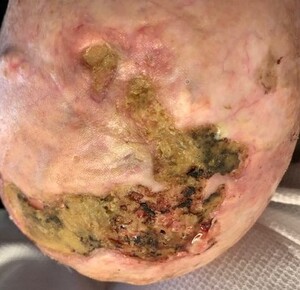A 73-year-old man presented with intermittent unresponsiveness and fevers. He had extensive squamous cell carcinoma (SCC) of the scalp on the right, treatment of which had resulted in radiation-induced osteonecrosis (Figure 1). He had no neurologic deficits on admission. Non-contrasted head CT demonstrated vasogenic edema in the right frontal lobe. Seventy-two hours later, he developed acute left hemiparesis. Repeat head CT (Figure 2) demonstrated a new large air-filled cavity in the right frontal lobe with mass effect.
‘Pneumocephalus’ describes intracranial gas in any location. ‘Tension pneumocephalus’ refers to subdural gas which exerts a mass effect. Intraparenchymal air with mass effect is consistent with ‘tension pneumatocele’.1–3 The mechanisms of intracranial air under tension can include a one- way valve phenomenon wherein air can enter but cannot leave, or the inverted soda-bottle effect where air is sucked in to replace leaked CSF.1,2 Tension pneumocephalus has been described most commonly in the setting of cranio-facial fractures while tension pneumatoceles are rarer.4 Two 3 mm bubbling holes were found on the patient’s calvarium and this air intake opening was occluded by dressings. He was placed on 100% oxygen and underwent craniectomy, debridement of necrotic bone, drainage of an abscess, and reconstruction. He ultimately passed away after two months.
The patient had an acute tension pneumatocele, resulting from a calvarial bone defect and infection related to SCC. Clinicians should be mindful of this possibility when caring for patients with extensive scalp defects and neurologic symptoms.
FUNDING SOURCE
No funding was received.
CONFLICTS OF INTEREST{#coi}
None
AUTHORSHIP
All authors had access to the data and participated in the preparation of the manuscript.
CORRESPONDING AUTHOR
Warren Gavin MD, FACP
Assistant Professor of Clinical Medicine
Indiana University School of Medicine
1800 N. Capitol Ave, Suite E 140
Indianapolis, IN 46202
Phone: 317-962-3925
wgavin@iuhealth.org



